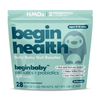Health Benefits of Breastfeeding for Infants
share this article

Breastfeeding is widely recognized as the optimal method of feeding infants, offering a multitude of health benefits that extend well beyond basic nutrition. The World Health Organization and the American Academy of Pediatrics both strongly recommend exclusive breastfeeding for the first six months of life.
In this blog, we’ll review how breastfeeding can provide infants with a variety of health benefits, even as they grow into their toddler years.
Nutritional Superiority
Breast milk is considered the gold standard for baby nutrition because it is uniquely tailored to meet the nutritional needs of infants. It contains the perfect balance of proteins, fats, vitamins, and carbohydrates necessary for a baby’s growth and development.
- Balanced Nutrition Composition: According to a study published in Pediatrics, breast milk provides all the essential nutrients in the right proportions, including over 200 beneficial components such as antibodies, hormones, and enzymes that are not found in formula milk [1]. These elements are crucial for the healthy development of infants.
- Growth and Development: Research in the Journal of Human Lactation shows that breastfed infants typically have better weight gain and growth patterns compared to formula-fed infants [2]. The study found that breast milk's unique composition supports optimal physical and cognitive development.
Daily reads to help your little ones lead happier and healthier lives.
Join the
Happy Gut Club
Begin Health Expert Tip
If your baby is currently on formula, you can increase the gut nutrients in their diet by adding Begin Health's Beginbaby Prebiotic + Probiotic, a 3-in-1 triple action formula with HMOs and Bifidobacteria that mimics the nutrition composition of human breast milk so your baby can get the right nutrients regardless of feeding methods.
Immune System Boost
Breastfeeding significantly boosts an infant’s immune system, helping to protect against various infections and diseases.
- Reduced Infections: Breast milk contains immunoglobulins, particularly IgA, which protect the infant's mucous membranes in the throat, lungs, and intestines. A study in the Journal of Nutrition found that breastfed infants had a lower incidence of respiratory and gastrointestinal infections compared to formula-fed infants [3].
- Long-Term Protection: The benefits of breastfeeding extend beyond infancy. According to research published in The Lancet, breastfeeding is associated with a reduced risk of developing chronic conditions such as type 1 diabetes, celiac disease, and certain types of cancers later in life [4]. The study emphasizes that the protective effects are dose-dependent, with longer durations of breastfeeding offering greater benefits.
Begin Health Expert Tip
HMOs are the third most abundant component of human breast milk. Check out what makes HMOs unique and how including them into your little one’s diet now can can protect and support their gut and and overall health now and into the future.
Cognitive Benefits
Breastfeeding has been linked to enhanced cognitive development and intelligence in infants.
- Higher IQ Scores: A meta-analysis in JAMA Pediatrics concluded that breastfed infants tend to have higher IQ scores and better academic performance later in life [5]. The analysis included over 17 studies and found a consistent positive correlation between breastfeeding duration and cognitive outcomes.
- Brain Development: Essential fatty acids, particularly DHA (docosahexaenoic acid), found in breast milk are vital for brain development. Research in Pediatric Research showed that breastfed infants have higher levels of DHA in their brain tissue, contributing to improved neurodevelopmental outcomes [6].
Builds Stronger Emotional Bonds
- Mother-Infant Bonding: Breastfeeding fosters a strong emotional bond between the mother and the infant, which is crucial for the infant’s emotional and psychological development.
- Emotional Development: The skin-to-skin contact and the act of breastfeeding itself promote bonding and emotional security. Research in Child Development indicated that breastfed infants exhibit fewer behavioral problems and higher levels of social competence as they grow older [8].
Summary
Breastfeeding offers a wide array of health benefits for infants, including balanced nutrition, immune system support, enhanced cognitive development, and stronger mother-infant bonding. If you are unable to breastfeed, a nutrition supplement such as Beginbaby Pre + Pro can provide your baby with the critical gut nutrients they need, regardless of feeding methods.
















